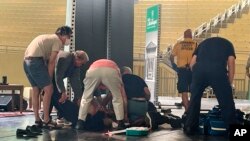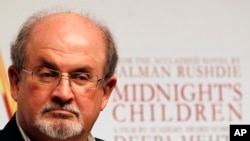Salman Rushdie, whose novel "The Satanic Verses" drew death threats from Iran's leader in the 1980s, was stabbed in the neck and abdomen Friday by a man who rushed the stage as the author was about to give a lecture in western New York.
A bloodied Rushdie, 75, was flown to a hospital and underwent surgery. His agent, Andrew Wylie, said the writer was on a ventilator Friday evening.
"The news is not good," Andrew Wylie, the agent, wrote in an email. "Salman will likely lose one eye; the nerves in his arm were severed; and his liver was stabbed and damaged."
Police identified the attacker as Hadi Matar, 24, of Fairview, New Jersey. He was arrested at the scene and was awaiting arraignment. State police Major Eugene Staniszewski said the motive for the stabbing was unclear.
An Associated Press reporter witnessed the attacker confront Rushdie on stage at the Chautauqua Institution and punch or stab him 10 to 15 times as he was being introduced. The author was pushed or fell to the floor, and the man was arrested.
Dr. Martin Haskell, a physician who was among those who rushed to help, described Rushdie's wounds as "serious but recoverable."
Event moderator Henry Reese, 73, a co-founder of an organization that offers residencies to writers facing persecution, was also attacked. Reese suffered a facial injury and was treated at and released from a hospital, police said. He and Rushdie were to discuss the United States as a refuge for writers and other artists in exile.
Security questioned
A state trooper and a county sheriff's deputy were assigned to Rushdie's lecture, and state police said the trooper made the arrest. But after the attack, some longtime visitors to the center questioned why there wasn't tighter security for the event, given the decades of threats against Rushdie and a bounty on his head offering more than $3 million for anyone who kills him.
Rabbi Charles Savenor was among the roughly 2,500 people in the audience. Amid gasps, spectators were ushered out of the outdoor amphitheater.
The assailant ran onto the platform "and started pounding on Mr. Rushdie. At first you're like, 'What's going on?' And then it became abundantly clear in a few seconds that he was being beaten," Savenor said. He said the attack lasted about 20 seconds.
Another spectator, Kathleen James, said the attacker was dressed in black, with a black mask.
"We thought perhaps it was part of a stunt to show that there's still a lot of controversy around this author. But it became evident in a few seconds" that it wasn't, she said.
Matar, like other visitors, had obtained a pass to enter the institution's 750-acre grounds, President Michael Hill said.
The suspect's attorney, public defender Nathaniel Barone, said he was still gathering information and declined to comment. Matar's home was blocked off by authorities.
Advocate for free expression
Rushdie has been a prominent spokesman for free expression and liberal causes, and the literary world recoiled at what novelist and Rushdie friend Ian McEwan described as "an assault on freedom of thought and speech."
"Salman has been an inspirational defender of persecuted writers and journalists across the world," McEwan said in a statement. "He is a fiery and generous spirit; a man of immense talent and courage and he will not be deterred."
PEN America CEO Suzanne Nossel said the organization didn't know of any comparable act of violence against a literary writer in the U.S. Rushdie was once president of the group, which advocates for writers and free expression.
Rushdie's 1988 novel was viewed as blasphemous by many Muslims, who saw a character as an insult to the Prophet Muhammad, among other objections. Across the Muslim world, often-violent protests erupted against Rushdie, who was born in India to a Muslim family.
At least 45 people were killed in riots over the book, including 12 people in Rushdie's hometown of Mumbai. In 1991, a Japanese translator of the book was stabbed to death and an Italian translator survived a knife attack. In 1993, the book's Norwegian publisher was shot three times and survived.
The book was banned in Iran, where the late leader Grand Ayatollah Ruhollah Khomeini issued a 1989 fatwa, or edict, calling for Rushdie's death. Khomeini died that same year.
Iran's current Supreme Leader Ayatollah Ali Khamenei has never withdrawn the edict, though Iran in recent years hasn't focused on the writer.
Iran's mission to the United Nations did not immediately respond to a request for comment on Friday's attack, which led a night news bulletin on Iranian state television.
Government protection
The death threats and bounty led Rushdie to go into hiding under a British government protection program, which included a round-the-clock armed guard. Rushdie emerged after nine years of seclusion and cautiously resumed more public appearances, maintaining his outspoken criticism of religious extremism overall.
He said in a 2012 talk in New York that terrorism is really the art of fear.
"The only way you can defeat it is by deciding not to be afraid," he said.
Anti-Rushdie sentiment has lingered long after Khomeini's decree. The Index on Censorship, an organization promoting free expression, said money was raised to boost the reward for his killing as recently as 2016.
In 2012, Rushdie published a memoir, "Joseph Anton," about the fatwa. The title came from the pseudonym Rushdie had used while in hiding.
Rushdie rose to prominence with his Booker Prize-winning 1981 novel "Midnight's Children," but his name became known around the world after "The Satanic Verses."
Widely regarded as one of Britain's finest living writers, Rushdie was knighted by Queen Elizabeth II in 2008 and earlier this year was made a member of the Order of the Companions of Honor, a royal accolade for people who have made a major contribution to the arts, science or public life.
In a tweet, British Prime Minister Boris Johnson deplored that Rushdie was attacked "while exercising a right we should never cease to defend."





